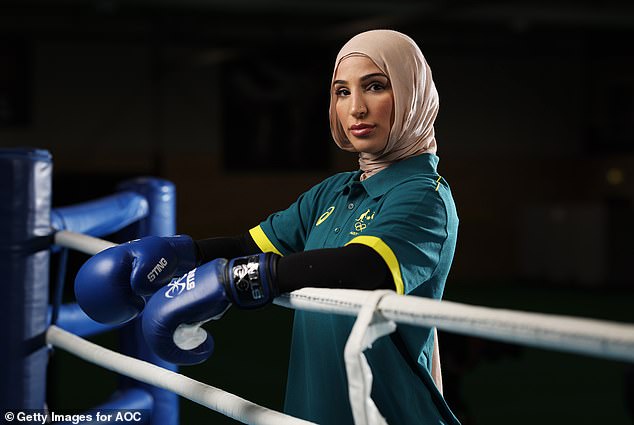- France bans its Olympic athletes from wearing hijab
- Australian Muslim boxer outraged by decision
Australian Muslim boxer Tina Rahimi has criticised France for refusing to allow female athletes to wear the hijab during the Paris Olympics.
Rahimi, 28, is one of 12 Australian fighters who have qualified for Paris, as Australia sent its largest-ever boxing team to the Games.
Rahimi, from Bankstown in Sydney’s west, wears a full hijab during her fights and won bronze in the featherweight division at the Commonwealth Games last year.
In April, France announced it would ban its athletes from wearing the hijab. French Sports Minister Amelie Oudea-Castera said the decision was taken to uphold the principle of secularism.
The host country has come under significant criticism, both within France and from international human rights groups, and now Rahimi has added his voice to the protest.
“This has to do with the laws of France,” Rahimi began in a social media post.
‘Luckily I can still participate with my hijab, for which I am very grateful.
“But it is unfortunate for French athletes because it has nothing to do with their performance. It should not affect their status as athletes.
Australian boxer Tina Rahimi (pictured) has criticised France for implementing a controversial hijab ban at the Paris Games
“It’s very difficult for you to be an Olympian and think that you have to give up your faith to participate in these events. I think everyone should be equal.
“What effect can my hijab have on me? People grow up wanting to go to the Olympics and that’s all they work for and all they want to achieve. That would be taking someone’s dream away.”
“I support all the French girls… It’s really very unfortunate.”
France is the only country in Europe that prevents women wearing hijab from participating in most national sports competitions.
Human rights groups have said the policy contravenes not only the IOC’s own guidelines but also international treaty obligations that France is bound to uphold.
The French Council of State confirmed in June 2023 the ban on female footballers wearing the hijab during matches, after the French Football Federation had imposed the ban.
Human rights groups have long expressed concern about the consequences of preventing women who wear the veil from participating in sports.
Amnesty International said these bans have had negative mental and physical consequences for women, causing “humiliation, trauma and fear”.

Rahimi says the decision is unfortunate and is a blow to people’s Olympic dreams
The French attitude towards the Olympic Games has also caught the attention of the United Nations.
While the UN did not directly address the ban, a spokeswoman for the UN Human Rights Office in Geneva said in a veiled rebuke after the policy was announced that “no one should dictate to a woman what she should or should not wear.”
He also noted that “discriminatory practices against a group can have harmful consequences” and added: “Restrictions on expressions of religion or belief, such as choice of dress, are only acceptable in very specific circumstances.”

